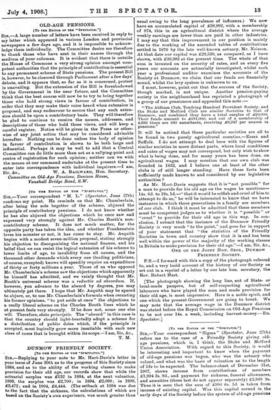OLD-AGE PENSIONS.
LTO TEl EDITOR OF TEl "8rscrxroa.1
SIR,—A large number of letters have been received in reply to my letter which appeared in various London and provincial newspapers a few days ago, and it is impossible to acknow- ledge them individually. The Committee desire me therefore t4:; thank those who have sent in their names through the medium of your columns. It is evident that there is outside the House of Commons a very strong opinion amongst com- petent authorities that the principle of contribution is essential to any permanent scheme of State pensions. The present Bill is, however, to be closured through Parliament after a few days' debate, and it appears that, so far as it is concerned, protest is unavailing. But the extension of the Bill is foreshadowed by the Government in the near future, and the Committee think that the best course will now be to try to bring together those who hold strong views in favour of contribution, in order that they may make their voice heard when extension is proposed, and may endeavour to secure that any such eaten- sion should be upon a contributory basis. They will therefore be glad to continue to receive the names, addresses, and descriptions of those who bold these views, and will keep a careful register. Notice will be given in the Press or other- wise of any joint action that may be considered advisable hereafter. Nothing can be done unless the body of opinion in favour of contribution is shown to be both large and influential. Perhaps it may be well to add that a Central Committee can do little more than act as a rallying-point and centre of registration for such opinion; neither can we with the means at our command undertake at the present time to enter into correspondence with individual inquirers.—I am, Sir, &c., W. A. BAILWARD, Hon. Secretary. Committee on Old-Age Pensions, Denison House, Vauxhall Bridge Road, S.W.


















































 Previous page
Previous page